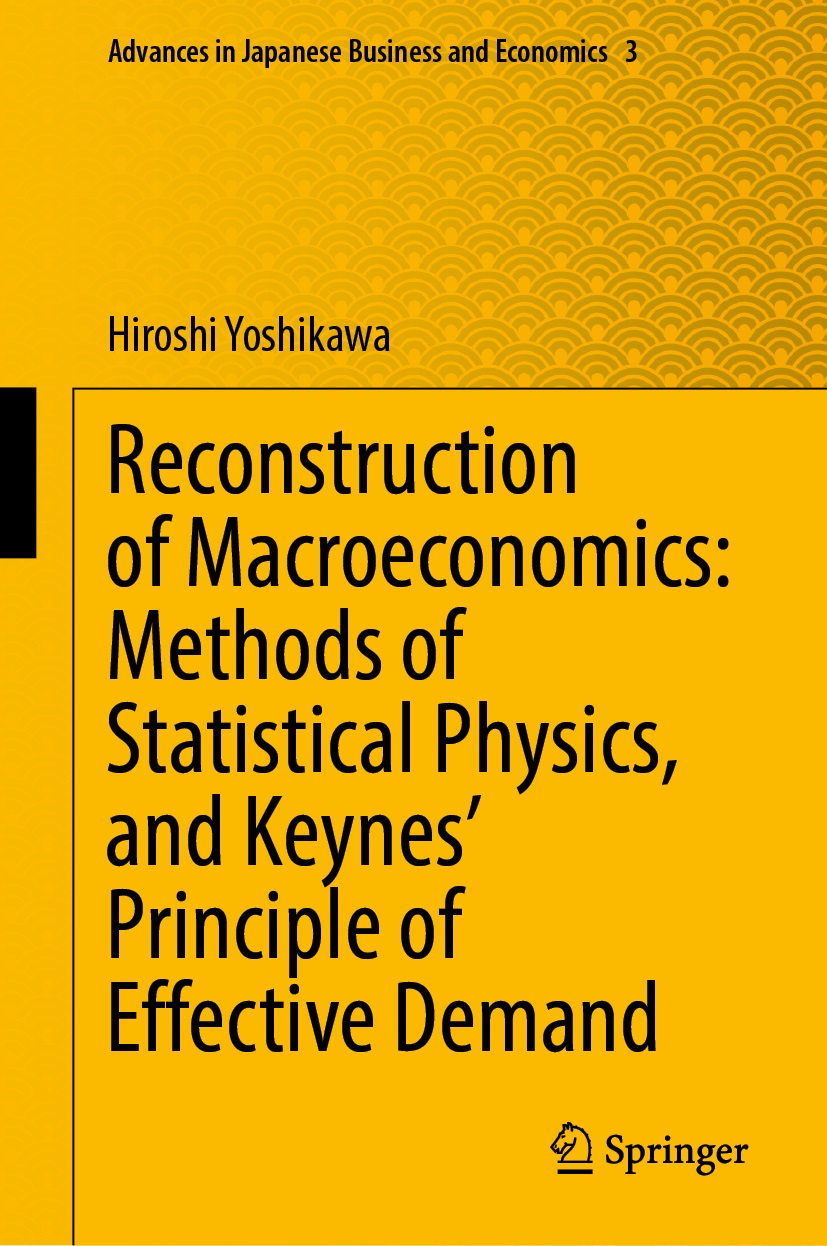
Title
Reconstruction of Macroeconomics: Methods of Statistical Physics, and Keynes’ Principle of Effective Demand
Size
238 pages, hardcover
Language
English
Released
October 30, 2022
ISBN
978-981-19-5263-0
Published by
Springer
Book Info
See Book Availability at Library
Japanese Page
Over the last 50 years, macroeconomics has drastically changed. Born in the midst of the Great Depression, it was once synonymous with Keynesian economics. However, under the flag of micro-foundations, it has turned to neoclassical macroeconomics.
Modern micro-founded macroeconomics is proud of its solid micro-foundations by which the profession understands that optimization of a micro-economic agent such as the household or firm is explicitly analyzed. In this book, I maintain that standard micro-foundations are on the wrong track. Ironically, modern macroeconomics, which emphasizes the significance of micro-optimization so much, takes it too carelessly.
The fundamental problem is that modern micro-founded macroeconomics rests on representative agent assumptions. In the case of real business cycle (RBC) theory and endogenous growth theory, this is obvious, for a literally single representative household/firm is assumed. In contrast, in the case of Lucas’s rational expectations model, labor search theory, and more recent heterogeneous agent new Keynesian (HANK) model and mean field games, the problem is much subtler because in these models, apparently heterogenous agents are assumed. However, economic agents differ only to the extent that the realization of relevant stochastic variables is different. They are assumed to face a common stochastic distribution with which they optimize. I contend that the assumption that all the economic agents share a common stochastic environment, namely, the assumption of representative constraints, is wrong. It is essentially nothing but a stochastic version of representative agent assumptions, not worthy of micro-foundations.
In modern micro-founded macroeconomics, aggregate demand has been purged as a determinant of the level of macroeconomic activity. This makes macroeconomics more or less Walrasian if on the surface it is different from Walras’s original framework. The tragedy is that the macroeconomy in which we happen to live is not Walrasian. In contrast to financial markets, prices play only a limited role in the real economy.
I provide Keynes’s principle of effective demand with a solid micro-foundation based on methods of statistical physics. Aggregate demand is the fundamental factor that governs the matching of workers and firms in labor markets.
Demand plays a central role not only in the short run but also in the process of economic growth because in advanced economies, saturation of demand for the existing goods and services constrains economic growth. Growth is generated by product innovations. This is where Keynes and Schumpeter meet.
The role of the financial market must be reconsidered. No doubt a well-developed financial market contributes to economic development through efficient resource allocation. However, it occasionally disturbs the macroeconomy. Efficient market hypotheses must be discarded as universal theory; “bubble” is a meaningful concept. I argue that the notion of “efficiency” differs fundamentally in the real economy and the financial market.
Macroeconomics requires different methods than microeconomics, that is, methods of statistical physics. Macroeconomics must change.
(Written by YOSHIKAWA Hiroshi, Professor Emeritus, Graduate School of Economics / 2024)
Table of Contents
1.1 Beginnings
1.2 Representative Consumer/Firm
1.3 Lucas Model—An Example
1.4 Economic Agent Optimization
1.5 Rational Expectations
1.6 Walras’ General Equilibrium Theory
2 Statistical Physics and Macroeconomics
2.1 Variational Principle—Is an Inorganic Particle Fundamentally Different from Us?
2.2 The Method for Macro Analysis
2.3 Ramsey Model
2.4 Markov Model of the Business Cycle—An Example
3 Stochastic Macroequilibrium: A Microfoundation for Keynesian Economics
3.1 Introduction
3.2 Limitations of Search Theory
3.3 Distribution of Productivity as a Measure of Underemployment
3.4 Stochastic Macroequilibrium—The Basic Idea
3.5 The Model
3.6 The Principle of Effective Demand
4 Business Cycle: The Role of Aggregate Demand
4.1 Introduction
4.2 Analysis Based on Industry Data
4.3 Concluding Remarks
5 Demand Saturation and Economic Growth—Where Keynes and Schumpeter Meet
5.1 Growth Theory
5.2 Lewis Model
5.3 Saturation of Demand
5.4 Product Innovations and Economic Growth
5.5 Population and Economic Growth
6 Prices, Wages, and Monetary Policy
6.1 Deflation and the Economy
6.2 Monetary Policy and Expectations
6.3 Determination of Price
6.4 Individual Prices and Aggregate Price Index
6.5 Wages
6.6 Summary
7 Financial Markets and the Real Economy
7.1 The Neoclassical Approach
7.2 Mathematics of Asset Price Fluctuations
7.3 The Bubble
7.4 Difference Between Financial Markets and the Real Economy
7.5 Rationality in Financial Markets
8 Summing Up
Appendix: Pioneers
References
Index
Related Info
“It (Chap. 3) captures analytically a good part of the intuition that underlies the Keynesian economics of people like Tobin and me.”
—Robert Solow, Emeritus Institute Professor of Economics, Massachusetts
Institute of Technology, Nobel Laureate in Economics, 1987
Professor Hiroshi Yoshikawa provides a unique synthesis of statistical physics and macro-economic theory in order to confront the dismal failure in economics and in finance to understand how an economy or a financial market works, given the heterogeneous decision making of many different individual interacting actors. Economics has failed in this regard with the naive and often misleading concept of “representative agents”. The author presents many insights on the historical development, concepts, and errors made by the most illustrious economists in the past. This book should be essential readings for any economics students as well as academic researchers and policy makers, who should learn to bring back good-sense thinking in their impactful decisions.
—Didier Sornette, Professor on the Chair of Entrepreneurial Risks at the Swiss
Federal Institute of Technology Zurich (ETH Zurich)
Japanese version:
YOSHIKAWA Hiroshi “Macro-Keizaigaku no Saikochiku” (Iwanami Shoten 2020) – out of stock
https://www.iwanami.co.jp/book/b521342.html
Award:
A person of Cultural Merit 2023
https://www.rieti.go.jp/en/about/activities/23102301/



 Find a book
Find a book

